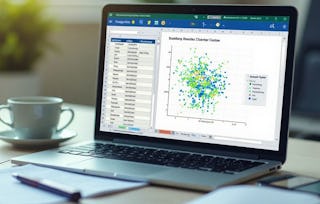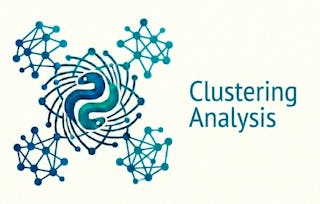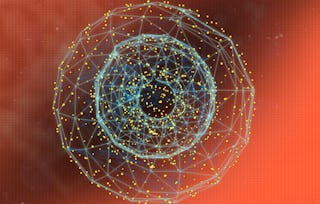This foundational course equips learners with the conceptual knowledge and practical skills needed to perform cluster analysis—an essential unsupervised machine learning technique—using SPSS. Through a blend of theoretical exploration and hands-on implementation, learners will define, differentiate, apply, and evaluate key clustering methodologies, including hierarchical methods, k-means clustering, and Two-Step cluster analysis.

SPSS: Apply & Evaluate Cluster Analysis Techniques

20 reviews
What you'll learn
Explain clustering concepts and differentiate hierarchical, k-means, and Two-Step methods.
Apply preprocessing and clustering techniques in SPSS to segment real-world data.
Evaluate cluster quality using BIC/AIC criteria, dendrograms, and silhouette scores.
Skills you'll gain
- Data Analysis
- Data Preprocessing
- Statistical Analysis
- Machine Learning
- SPSS
- Data Visualization
- Model Evaluation
- Statistical Methods
- Machine Learning Algorithms
- Unsupervised Learning
- Applied Machine Learning
- Skills section collapsed. Showing 10 of 11 skills.
Details to know

Add to your LinkedIn profile
August 2025
7 assignments
See how employees at top companies are mastering in-demand skills

There are 2 modules in this course
This module introduces the fundamental principles of cluster analysis, a core technique in unsupervised machine learning. Learners will explore the conceptual basis of clustering, understand how clustering groups data points based on similarity, and investigate widely used clustering techniques including hierarchical clustering and k-means. Emphasis is placed on understanding how these methods operate, their practical applications, and the tools used to visualize and evaluate clustering results. By the end of this module, learners will gain a strong conceptual and technical foundation in clustering approaches, preparing them for more advanced machine learning techniques and real-world data segmentation tasks.
What's included
8 videos4 assignments
This module focuses on the implementation and interpretation of cluster analysis techniques using SPSS. Learners will explore practical workflows involving Two-Step clustering and K-means clustering, including the evaluation of clustering quality and methods for handling missing data. Through hands-on demonstrations, students will gain experience with SPSS output interfaces, learn to navigate clustering diagnostics, and apply data preprocessing strategies such as listwise and pairwise deletion. The module equips learners with practical tools to translate unsupervised machine learning concepts into real-world analytical outputs.
What's included
4 videos3 assignments
Explore more from Machine Learning
 Status: Preview
Status: Preview Status: Free Trial
Status: Free TrialUniversity of Colorado Boulder
 Status: Free Trial
Status: Free TrialUniversity of California, Irvine
 Status: Free Trial
Status: Free TrialUniversity of Illinois Urbana-Champaign
Why people choose Coursera for their career

Felipe M.

Jennifer J.

Larry W.

Chaitanya A.
Learner reviews
- 5 stars
85%
- 4 stars
10%
- 3 stars
5%
- 2 stars
0%
- 1 star
0%
Showing 3 of 20
Reviewed on Dec 19, 2025
It’s suitable for students or professionals working with data analysis and research.
Reviewed on Dec 12, 2025
The concepts are explained in a step-by-step manner, making it easier to follow even for learners with limited statistics background.
Reviewed on Nov 28, 2025
The instructor explains why cluster analysis is used in real situations, not just how to click through menus.

Open new doors with Coursera Plus
Unlimited access to 10,000+ world-class courses, hands-on projects, and job-ready certificate programs - all included in your subscription
Advance your career with an online degree
Earn a degree from world-class universities - 100% online
Join over 3,400 global companies that choose Coursera for Business
Upskill your employees to excel in the digital economy
Frequently asked questions
To access the course materials, assignments and to earn a Certificate, you will need to purchase the Certificate experience when you enroll in a course. You can try a Free Trial instead, or apply for Financial Aid. The course may offer 'Full Course, No Certificate' instead. This option lets you see all course materials, submit required assessments, and get a final grade. This also means that you will not be able to purchase a Certificate experience.
When you purchase a Certificate you get access to all course materials, including graded assignments. Upon completing the course, your electronic Certificate will be added to your Accomplishments page - from there, you can print your Certificate or add it to your LinkedIn profile.
Yes. In select learning programs, you can apply for financial aid or a scholarship if you can’t afford the enrollment fee. If fin aid or scholarship is available for your learning program selection, you’ll find a link to apply on the description page.
More questions
Financial aid available,


